INSTRUMENTS
1/45
There's no tags or description
Looks like no tags are added yet.
Name | Mastery | Learn | Test | Matching | Spaced |
|---|
No study sessions yet.
46 Terms
Dental suite
Should be in a separate area away from surgical procedures
Needs good lighting
Magnification should be available
Tables
Consider ergonomic chairs or stools
Tables
Should be designed to allow personnel to sit for procedures
Adjustable height is ideal
Loupes
Many different types
Recommended for dentistry = 2.5x
Length aerosolized bacteria can stay in the air
8-12 hours
Dental Unit
All have a water component
Air-driven
Motor Driven units
Water Component
Helps rid debris and prevent thermal damage
use demineralized water
Air-Driven
The compressor delivers pressurized air to the handpiece
Monitor oil levels
Drain air daily!
Motor driven units
Not as efficient as Air-Driven
Small, Portable, less expensive
Highspeed handpiece
FOR CUTTING BONE OR TEETH
Never run without a bur
Store bur in place
Most are Autoclavable
Burs
Most are disposable
throw away after every procedure
exception is the diamond bur
if not replaced, will cause turbine failure
Crosscut fissure bur for sectioning
Round burs for alveoloplasty, endodontic procedure
Low Speed handpiece
Usually for polishing
Prophy angle for polishing
Polish
Polish
fine grit
decrease RPM
2 types of Ultrasonic Scaler
Magnetostrictive and Piezoelectric
Magnetostrictive
Working end vibrates in figure 8 motion
Needs replaced if light shines through the stacked end
If stacked tips are used, fill with water before attaching tip

Piezoelectric
Linear vibrations
Have small metal tips that screw into the handpiece
Contains crystals that are active when electrified
distal 3mm of the tip
3 Ultrasonic tips
Periodontal tip, Universal tip, Beaver tip
Periodontal tip
For SUBgingival cleaning
Universal tip
Can be used on crown or subgingival
Not efficient at either
Beaver tip
For SUPRAgingival use only
More efficient at removing calculus
Ultrasonic Scaling
Piezio units should come with wear card
efficiency is lost over time
Use card to know when to replace
Grasp lightly with modified pen grasp
let the instrument do the work
Keep tip moving in constant contact with tooth
No more that 10 sec (REALLY 5-7) per tooth at one time
Time you can leave the ultrasonic scaler on the tooth
5-7 seconds
Assessment Instruments
Periodontal probe, Dental explorer, mirror
Periodontal Probe
For assessing pocket depth and attachment level
Each line represents 1mm
Different styles exist; make sure you are comfortable reading!
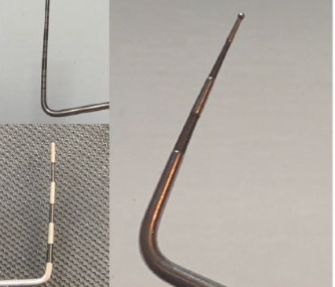
Normal canine pocket depth
1-3mm
Normal feline pocket depth
<1mm
Dental Explorer
Almost always on opposite end of probe
Allows for assessment of enamel and pulp exposure
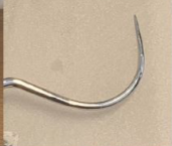
Mirror
Underutilized, but very helpful
Calculus removing forceps
Used to remove large amounts of calculus build-up
Used to help with leverage
can cause enamel damage if used too roughly
You can accidently extract loose teeth
Not recommended in cats
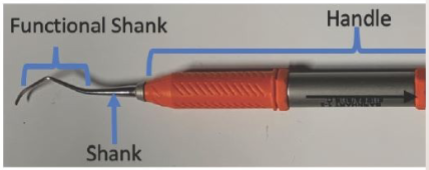
Morphology of hand instruments
Working end, Terminal shank, Functional shank
Working end
Functional part that comes in contact with tooth surface
Has sharp blade(s)
must be shrp to function correctly
Terminal Shank
Part just before it attaches to the working end
Functional Shank
Part that allows adaption of working end to each tooth
Curette
Rounded edges
For SUBGINGIVAL use
removing calculus
Curettage (periodontal debridement)
Scaler
2 Sharp sides and sharp tip
SUPRAGINGIVAL ONLY (crown)
Always pull toward yourself
away from gumline
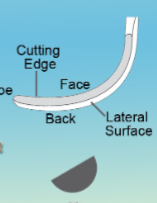
What is this?
Curette
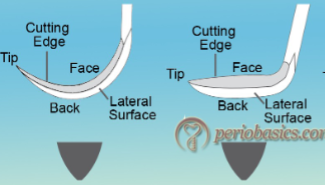
What is this?
Scaler
Universal Curette
2 sharp edges
for lighter treatment
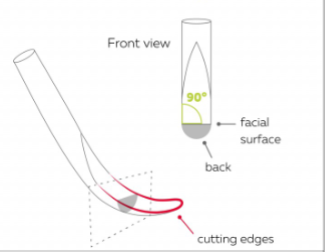
Gracey Curette
Only 1 cutting edge
Slightly “tilted”
Can be area specific
Have a mini version better for cats
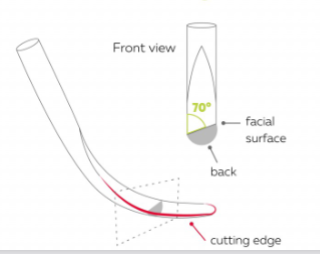
Elevators
Winged or regular
Used for rupturing the periodontal ligament
Using rotational and prying forces
Luxators
Very similar to elevators
thinner profile for cutting the ligament
No rotating or prying against bone
Periosteal Elevators
Separate periosteal tissue connecting attached gingiva
gingival flaps
Surgical instruments
Elevators, Luxators, Periosteal elevators, Scalpel blade and handle, needle holders, 4-0 or 5-0 suture, Minnesota retractor
Sharpening
Not all practices follow proper sharpening
It is very easy to mess up an instrument from sharpening
when possible, major sharpening should be done by professionals familiar with dental instruments
Sharpening Materials
Fine-grit Arkansas flat and Conical stones
Honing Oil
Plastic test stick
After every cleaning and before autoclaving
How often sharpening should occur
PPE
Cap, Goggles/Visor, Lab jacket, Gloves, Chlorhex Spray on mouth before starting scaling, Dosimeter during radiographs